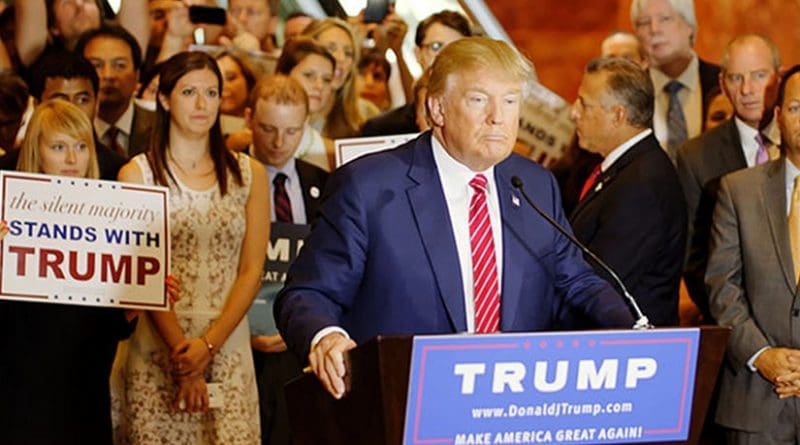Trump’s Victory: A Double-Edged Sword – OpEd
The stunning election victory for Donald Trump, despite coming second in terms of popular votes, represents a double-edged sword that is rooted in the paradoxes and built-in incoherence of the Trump political ‘phenomenon’. As the dust of the highly toxic pre-election campaigns settles and the American nation embarks on a new path of patching the wounds, the aftershocks of the Trump victory will be felt like a mega political earthquake for sometime.ƒ
The Democrats, for sure, will be reeling in pain and puzzlement as to how they lost on all fronts — the White House and the Congress — when a precious four weeks ago Hillary Clinton was ahead by double digit numbers? Was it the FBI’s untimely intervention, or the reservoir of hidden (mainly rural) Trump voters, or the accumulated pile of Wikileaks ‘dirt’ on the Clinton dynasty, etc., that nailed the coffin on Hillary’s second bid for presidency? Or was it the Democratic Party’s abandoning the white working class Americans and failing to present a viable alternative economic vision that proved to be the ultimate undoing? Or was it the combination of all these factors and, above all, Trump’s own charisma that confounded all the US establishment, including the mainstream media that lined up behind Clinton — to no avail?
In the on-going autopsy of the Democratic Party, no single factor may emerge as the leading cause of the party’s demise at the ballot boxes. What is certain, however, is that Trump the Republican billionaire somehow managed to appear as the representative of the have-nots, stealing the torch traditionally held by the Democratic Party. In many respects, however, Trump is a false prophet whose economic and social agenda, such as cancelling the Obamacare which will throw off some 20 million poor Americans off the assisted insurance, can hardly be said to be pro-working class. There is undoubtedly a great deal of chasm between the perception and reality, which will likely cause a good deal of voter disillusionment with Trump in the future.
But, for an anti-establishment candidate who relies heavily on known establishment figures for policy advise — Newt Gingrich, Rudi Giuliani, etc. — Trump has his job cut out for him, particularly in the first year of his presidency when the voter expectations of his delivery of promises will be at its highest. Promising work on America’s infrastructure is a good beginning, but hardly sufficient, and Trump needs to address the needs of millions of working Americans who aspire for higher wages and benefits and, yet, most have voted for a pro-business figure who advocates tax cuts for the rich, which will in turn limit the government’s revenues allocated to social (welfare) policies. A return to laisses faire capitalism, on the other hand, is virtually impossible as it would sound the death knell for the welfare capitalism of the past century that has kept social peace.
Still, Trump ‘the outsider’ who will enjoy a Republican-dominated Congress is apt to take some measures, such as with respect to his newly-unveiled urban pact for the African-Americans, that could compensate for his perceived racist agenda. Promising to be the president for all Americans including “all races and all religions,” Trump in his victory speech showed a glimmer of hope that he will act responsibly and as a national unifier rather than a voice of white supremacy.
As expected, Trump’s victory has been warmly welcomed by Russia, which hopes to restore US-Russia relations on a healthy footing again, and it remains to be seen how Trump will act on the Syrian crisis, where the US has often been a spoiler of peace opportunities? Another issue is Iran’s nuclear agreement, which Trump has opposed and yet cannot rescind unilaterally short of damaging US’s global image and interests. Surrounded by anti-Iran hawks who provide foreign policy advise to him, such as John Bolton and Rudi Giuliani, Trump may adopt a more hawkish position vis-à-vis Iran, that could escalate tensions in Persian Gulf. Hopefully, Trump, who has prioritized the domestic agenda, will not prove reckless on foreign policy and thread a cautious line, particularly in the volatile Middle East, where the menace of terrorism has wreaked havoc. Trump’s pledge to fight ISIS with full force is welcome news for the region, provided that it does not prove to be a clever disguise for US interventionism.

